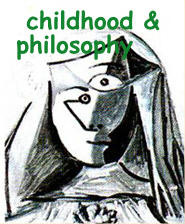a philosophical approach to emotions: understanding love’s knowledge through a frog in love
Keywords:
M. Nussbaum, filosofia para crianças, emoções, phronesisAbstract
In this paper I offer a philosophical approach to the emotion ‘love’, as a response to more psychological approaches presupposed in ‘emotional intelligence’, ‘emotional literacy’ programmes, or how some Philosophy for Children practitioners interpret ‘caring thinking’. Martha Nussbaum’s philosophy of emotions expressed in her book Love’s Knowledge, and the complex arguments contained within it have been given a narrative context: the picturebook Frog in Love by Max Velthuijs. The narrative contextualisation shows how literature can be used to explore the meaning of love philosophically, but also (and this is the main thrust of my paper) it is an illustration of how some works of literature can do justice to the complexity involved in understanding emotions. The paper starts with an exposition of one of the sources of a currently popular view of emotion by psychologists and educators. Originally conceptualised by Plato, emotions are regarded as mental states in need of mastery and control. As a result, some parents and educators argue that their age and experience puts them in an advantageous position to tame youngsters’ wild ‘sides’ and to help them ‘mature’ into adults who understand and manage their emotions, and become so-called emotionally ‘literate’ or ‘emotionally intelligent’. For educators it is an appealing promise of empowerment and achievement for all (Miller, 2009, p 222). One particular approach to teaching and learning called Philosophy with Children (P4C) is also increasingly promoted and adopted in schools as a vehicle for emotional ‘intelligence’ or emotional ‘literacy’ (see e.g. Lewis, 2007). The caring thinking it encourages is interpreted psychologically often without acknowledging its moral and political dimensions. After a brief introduction of P4C, I problematise a psychological understanding of emotion by focusing on one book in particular, Martha Nussbaum’s Love’s Knowledge. With the help of the picturebook Frog in Love I entangle some of her complex arguments about ‘love’, what it means, and how literature can provide insight. I argue against a behaviourist approach to emotions, and through phronesis, that is, a detailed exploration of ‘love’ in the context of Frog in Love I intend to show an alternative, philosophical approach to emotions that regards emotions as neither fixed entities, nor feelings ‘inside’ our ‘selves’ that need to be managed or controlled, but as complex judgments, as linguistic concepts. Psychological approaches to emotions often misunderstand the ‘golden mean’ principle to mean self-discipline and willpower, but for Aristotle self-control is not a virtue. Instead, I argue how emotions need to be regarded as informative expressions of and responses to dynamic social relationships and return at the end of the paper to the relevance of this point of view for the theory and practice of P4C as phronesis.Downloads
Download data is not yet available.
Downloads
Published
2009-06-29
How to Cite
MURRIS, Karin. a philosophical approach to emotions: understanding love’s knowledge through a frog in love. childhood & philosophy, Rio de Janeiro, v. 5, n. 9, p. pp. 5–30, 2009. Disponível em: https://www.e-publicacoes.uerj.br/childhood/article/view/20597. Acesso em: 12 may. 2025.
Issue
Section
articles




